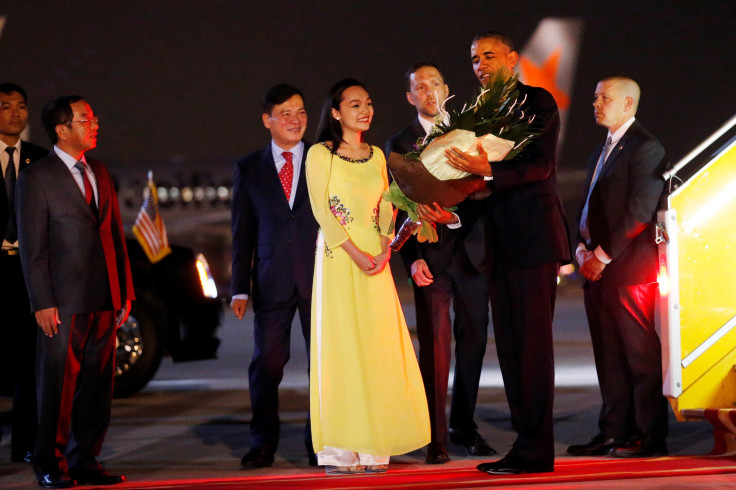Obama Arrives In Vietnam, Seeks To Turn Old Foe Into New Partner

U.S. President Barack Obama arrived in Vietnam late Sunday ahead of a three-day trip aimed at sealing the transformation of an old enemy into a new partner to help counter China's growing assertiveness in the region.
Four decades after a war with Vietnam that deeply divided opinion in America, Obama aims to boost defense and economic ties with the country's communist rulers while also prodding them on human rights, aides say.
His visit has been preceded by a debate in Washington over whether Obama should use the three-day visit starting Monday to roll back an arms embargo on Hanoi, one of the last vestiges of wartime animosity.
That would anger China, which resents U.S. efforts to forge stronger military bonds with Beijing's neighbors amid rising tensions in the disputed South China Sea.
But in the hours ahead of his arrival in Hanoi, where he was greeted on a red carpet by foreign ministry officials, there was no immediate word of a final U.S. decision on the ban.
Vietnam's poor human rights record is a sticking point, but the Obama administration appears increasingly swayed toward giving Hanoi some leeway to build its deterrent against Beijing.
Obama's visit follows what the Pentagon called an "unsafe" intercept by Chinese fighter jets of a U.S. military reconnaissance plane over the South China Sea on Tuesday.
"Nobody has any illusions," said Evan Medeiros, Obama's former top Asia adviser. "This trip sends important signals to China about U.S. activism in the region and growing U.S. concern about Chinese behavior."
Vietnam's government earlier this month said lifting the embargo would show mutual trust and that buying arms from its partners was "normal".
There has been much excitement about Obama's arrival in a country with a young population enthusiastic about closer U.S. ties, and resentful of Vietnam's economic dependence on its unpopular neighbor China.
"Obama visit to Vietnam is closure of the past," said Hanoi cyclo driver Vu Van Manh. "What's important is the present. The two countries can bond more to develop both economies."
As a sign of the capitalism that now thrives in Vietnam, some opportunistic businesses are using pictures of a smiling Obama to sell suits and instant photo services.
Bilateral trade has swelled 10 times over since ties were normalized in 1995 to around $45 billion now. Vietnam is Southeast Asia's biggest exporter to the United States, with textiles and electronics the largest volumes.
© Copyright Thomson Reuters {{Year}}. All rights reserved.





















